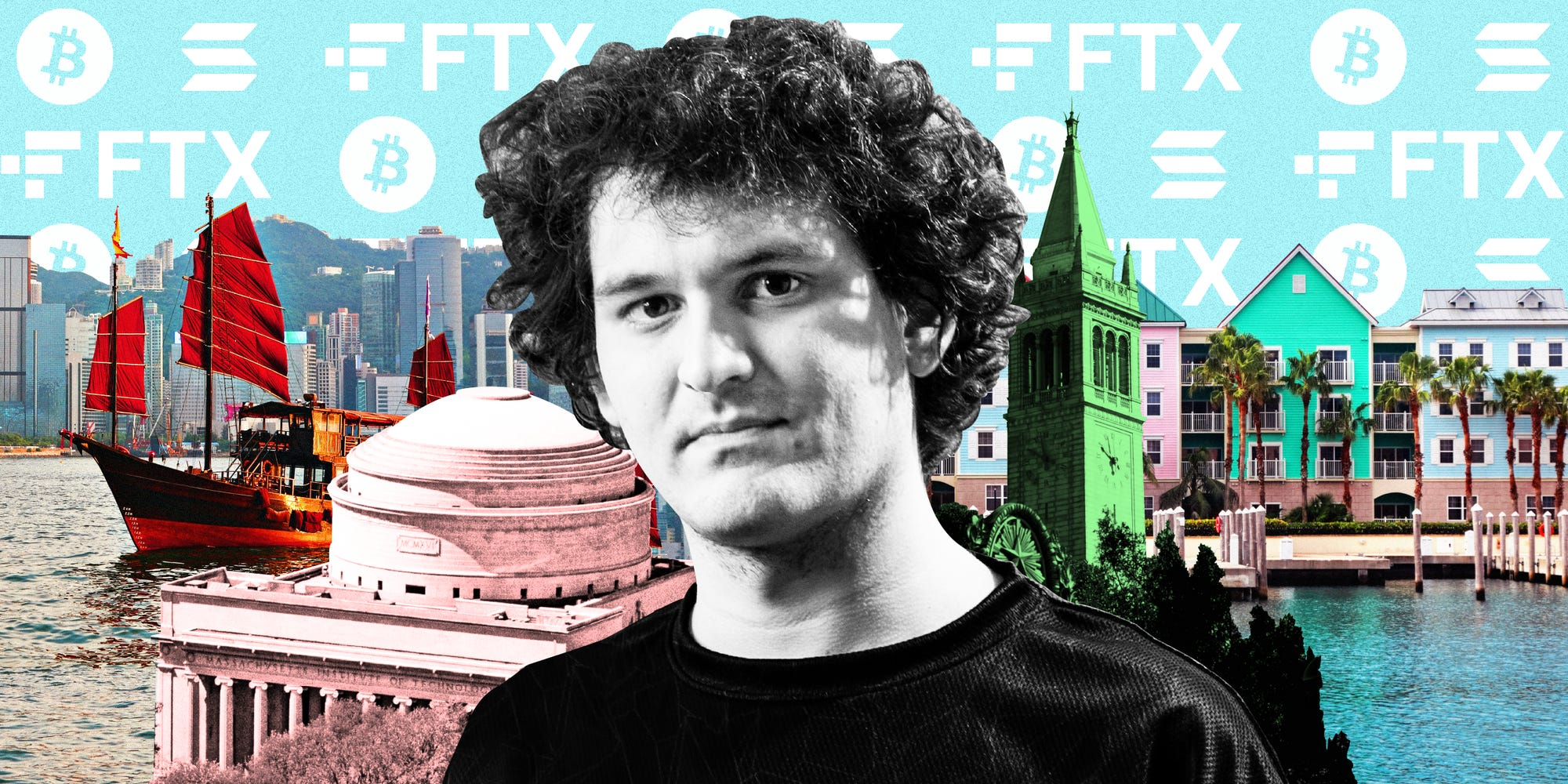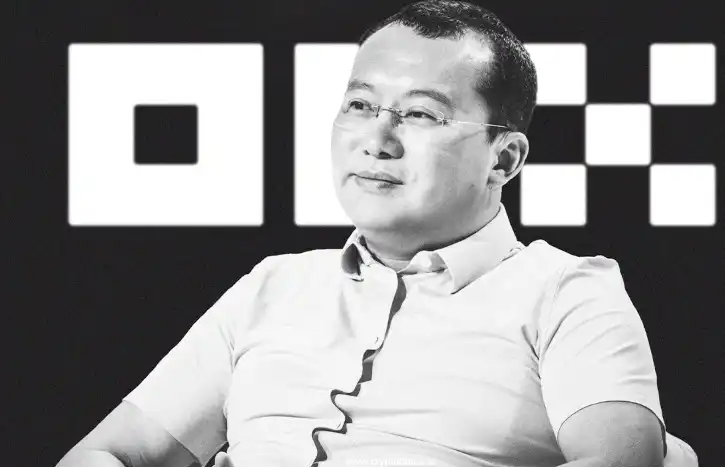The B side of SBF: a $32 billion valuation unicorn for 4 hours of sleep
Original title: FTX founder Sam Bankman-Fried gets by on 4 hours' sleep and multitasks on 6 screens. Insiders break down what the 29-Year-old Crypto billionaire is really like -- and the tough questions Facing his Company."
Source: BusinessInsider
Author: Vicky Ge Huang & Kari McMahon
Http://tank.tank.tank.tank.tankers

As you can imagine, The founder of FTX. Sam Bankman-Fried (SBF) & NBSP; Sleep only every day. 4 Hours, simultaneous use & NBSP; Six screens for multitasking? Next, we will reveal this one. The 29-year-old crypto billionaire takes a closer look at some of the tough issues facing his company.
The collage above is filled with elements like MIT, Hong Kong, Berkeley, Calif., and Nassau, Bahamas, with a cyan background. The logo of FTX, Bitcoin and Solana, and SBF is right in the middle of the painting -- all elements that relate to his personal background.
About three years ago, in 2018, SBF was just a young Wall Street trader. Who would have thought he would become a crypto company founder? He recalls going to a conference in Asia and finding a bitcoin price difference between Asian and Western exchanges, a difference known as the "pickle premium." SBF's sense of smell is so acute that he rented a WeWork office for a few days and put the rest of his Alameda team on the next flight. Was a crypto trading startup founded by SBF, which was just getting started).
Some people may think that such a mess would make the company employees unhappy, but SBF managed to do it, which is his personal charm.
Referring to SBF's seemingly reckless decision in the first place, Andrew Croghan, former chief operating officer of Alameda, says SBF told them: "We need to get someone over here right now. I think we're losing $50,000 a day if we stay in Berkeley instead of Hong Kong."
As Soon as they landed, Croghan recalls, the new employees set up their computers and scoured the malls and street stalls near WeWork's offices for monitors and data cables.
"Some people might be worried about moving to a new location so quickly and missing a lot of things at once," says Andrew Croghan. "SBF didn't. Instead, we subtracted for efficiency.
Moving offices to Hong Kong isn't just about work, but it's all about crypto arbitrage, where SBF and Alameda make 10% of their daily revenue on million-dollar trades. As of December 13, SBF has gone from being a trader in obscurity four years ago to the head of a crypto empire with a personal fortune of $26.5 billion, according to Forbes. The decision to move the company to Hong Kong years ago is a key milestone in his success.
In 2019, SBF launched FTX, a cryptocurrency trading platform that has now surpassed the market capitalization of several companies listed in the S&P 500. FTX also has the trust and financial backing of global investors (who are, of course, incredibly savvy), Investment giants including Tiger Global, Sequoia Capital and BlackRock have all participated in FTX's recent funding rounds. Not only that, SBF has partnered with some of the biggest names in sports, business and entertainment, from NBA star Steph Curry to famous NFL quarterback Tom Brady. Today, SBF has become a talking point in the crypto community, regularly appearing on financial media like Bloomberg and CNBC to analyze market trends. He is also a philanthropist, and since the beginning of 2021, FTX has donated more than $16 million to charities.
Of course, SBF is doing all this at a time when the cryptocurrency industry is facing the most intense regulatory scrutiny in its history. SBF's divestment decision -- his second reversal in two years -- comes after mainland Chinese regulators cracked down on all forms of cryptocurrency mining and trading. FTX moved to the Bahamas after the country passed landmark cryptocurrency support legislation at the end of 2020. By doing so, FTX has been spared a lot of trouble, while its competitors -- some of the other cryptocurrency exchanges -- have faced hefty fines or regulatory investigations.
SBF's struggle, however, has not always been smooth. Compared to other competitors, The greatest "weakness" of... SBF company staff is a group of developers, the members of the organization structure and SBF believe "efficiency" are inseparable, but with FTX began to move, SBF and to run both at the same time the rapid growth of the company, great pressure also followed, some of his employees said already overburdened, will be offered to resign.
Of course, all this comes as no surprise to SBF's Silicon Valley supporters, who see him as a once-in-a-century talent who does everything right. "To me, SBF is like the Mark Zuckerberg of cryptocurrencies," said Edith Yeung, a venture capitalist at Race Capital and one of FTX's seed investors. According to Forbes, SBF is the only person other than Mark Zuckerberg to become rich in a remarkably short period of time.
On the other hand, several of SBF's closest friends, colleagues and investors got to know the talented founder well. They shared what it took for him to succeed, what it was like to work with a leader who was ambitious and enthusiastic, and how SBF managed to "bypass" regulatory scrutiny and attract investors.
These colleagues stress that SBF is walking a tightrope: keeping investors happy while not burning a candle at both sides of its staff as it expands.
People who know SBF say a key reason he achieved his goals is that SBF is exceptionally skilled at multitasking.
Caroline Ellison, co-CEO of Alameda Research, said: "You'll often see SBF watching football on one screen, YouTube videos like Rihanna on another screen, replying to messages on a third screen, trading on a fourth screen, making phone calls on a fifth screen, all almost simultaneously."
Having such skills may be related to SBF playing games as a child. SBF loved board games when he was a kid, but he used a timer to play two games at once.
The growing background of SBF & NBSP;
SBF's parents are both Stanford law professors and he has a younger brother. It can be said that the experience of playing games at an early age has tempered his skills in multi-threading. Both he and his brother Gabe Bankman-Fried enjoyed playing board games like Magic the Gathering, bridge, and chess when they were young. However, it was no longer challenging for SBF to play only one game at a time.
Gabe Bankman-Fried "We grew up playing board games," he recalls. "My brother would use a timer to play two games at once."
SBF admits that this is a way to avoid boredom, as playing only one game at a time can make him feel bored: "If I don't feel like I need to put my mind to it, like there's no time pressure, or my opponent is dragging his feet, I start to get bored," he said, adding that he starts playing with his phone, computer, or other things because his opponent is slow.
As a student at THE Massachusetts Institute of Technology, SBF also joined a group at the school called   The frat organization of Epsilon Theta, which has approximately NBSP; 20 people, often have various parties at the university, such as drinking, solving puzzles, playing board games and so on. In school, SBF not only focused on study, but also participated in various student group work. He recalled that he met his former alumnus, Alamedd, during a five-week math camp at Mount Holyoke in 2010. Sam Trabucco, co-CEO of Research.
SBF joked that he was definitely a "dud" at university when it came to completing his studies. "I usually only work for about an hour and a half a day, so IT's hard to meet deadlines," he said. "I was kind of a bad student."
But in June 2014, SBF joined Jane Street, one of wall Street's most storied quant trading firms, where strong innate time management skills became one of his strengths. According to Ellison, who works in the firm's stock-trading department, SBF particularly enjoyed intellectual challenges and quickly developed a knack for making quick decisions under pressure.
While working on Jane Street's international ETF desk, SBF learned how to arbitrage ETF price differentials across platforms around the world, but it wasn't until he started trading in the fast-changing crypto market that his talent really began to show.
In October 2017, SBF founded Alameda Research in Berkeley, California, where he began his game-changing Bitcoin arbitrage trade.
Ellison and Trabucco both say that SBF's uncanny ability to spot opportunities and move faster than most traders quickly earned him the nickname "crypto whale" -- because of the company's amazing moves in the crypto market.
As Alameda Research grew so rapidly that it could no longer operate under the radar, it soon caught the attention of Ryan Salame, who was working on the over-the-counter trading desk of Hong Kong-based cryptocurrency firm Circle. According to Ryan Salame recalls discovering that Alameda& NBSP; Research's companies "came out of nowhere" and often offered "very competitive" pricing in the market, prompting deals between them.
It wasn't long before. Salame decided to work for the SBF after being approached at a conference in Singapore. Soon, Ryan "I have never spoken to or interacted with someone like SBF before," said Salame, who officially joined Alameda as head of OTC practice. "He is not only smart, he is emotional, and he communicates with people in a very real way and talks to them about things they are interested in. I was very impressed with him."
Through & have spent Alameda After earning a trading profit, Having enough money to donate to charity -- which is the main reason he turned to cryptocurrency in the first place. But the SBF has bigger ambitions.
In a later interview, he said, "I think it's a good idea. Revealed that he hopes to create a trading platform to replace the "terrible trading platforms" he traded on in 2017 and 2018.
It's a very difficult task, you know. Running a cryptocurrency trading platform has never been easy, especially in the United States, where banks are wary of illegal use of cryptocurrencies and generally refuse to do business with trading platforms. Once they have established themselves as legitimate businesses, big companies like Coinbase and Gemini have to comply with various regulations that can be a burden for exchange operators. As a result, cryptocurrency trading platforms in the United States tend to offer only a limited range of products and services.
By contrast, platforms that are not based in the United States face few restrictions and can offer geographically specific derivatives, such as leveraged tokens and tokenized stocks. On top of that, traders can trade with 100 times leverage by Posting margin -- meaning anyone with $1,000 can immediately participate in a $100,000 trade. This flexibility has also fuelled the rapid growth of offshore trading platforms.
In July 2017, Zhao changpeng launched the first Token offering, raising $15 million for Binance -- opening the ethereum-based BNB ERC-20 Token as a cryptocurrency trading platform, and founded &NBSP in 180 days. Binance, valued at $1 billion. SBF didn't launch FTX until 2019, but its derivatives platform has grown from nowhere in just two years to now ranking sixth in spot trading and second in derivatives trading -- behind Binance. (FTX and Binance both cut leverage limits to 20 times from 100 and 125 times respectively in July, but some offshore platforms such as Bybit still offer traders leverage of up to 100 times.)
For now, professional traders are flocking to FTX because of its value-for-money advantages, such as low transaction fees, supported lending products, trading tokenised stocks and futures, and trading across multiple sub-accounts with different levels of risk.
SBF worked hard to create a competitive platform in such a short time, famously sleeping four hours a night on a beanbag at his desk and taking calls from clients and investors at 3am.
One of the things THAT worries me most about FTX is its slowness and confusion.
Ryan Salame SBF had been working for 30 hours straight and was just getting ready for bed when a client called. Look at the man lying down. Unable to wake him up, Salame rescheduled the appointment with the client -- much to the chagrin of the SBF, who said flatly: "You'll have to wake me up next time, there's no doubt about that."
Ryan Salame says the other main reason he worked for SBF was that he was overwhelmed by his charisma -- so much so that he gave up Hong Kong. Alameda Research OTC head, followed his boss to the Bahamas and became CEO of FTX Digital Markets.
Ryan "This company means everything to SBF," Salame admits.
FTX has reaped handsome rewards since moving its headquarters to the Bahamas. The Bahamas has beautiful beaches and high-speed Internet network, it is very attractive for encryption currency traders, not only that, because the island distance like Miami encryption center is an hour's flight, so FTX team doesn't have to be 12 hours time difference, and strict isolation requirements and problems.
However, SBF won't be lying on the beach enjoying the sun, as his work schedule and schedule have tightened since moving to the Bahamas. As a result, problems began to arise because not all employees could keep up with SBF, and three former employees and one insider, who spoke on the condition of anonymity, said they were exhausted and resigned, even before they moved to the Bahamas.
FTX and Alameda Noah Dummett, a former trader at Research, said: "While working with SBF was incredibly inspiring, it was also exhausting. Everyone was expected to work towards a common goal, so everyone needed to manage their time and direction well and work towards that goal consistently. So if you choose to work at Alameda and FTX , it means you have little time for yourself and burnout is normal."
"It's the same thing every day: you go in, you read, you eat breakfast, you write code, you order while you work, you eat while you work, you go home," complains an anonymous software engineer who has worked at both FTX and Alameda. "Seven days a week."
Compared with its competitors, FTX has very few employees. According to SBF itself, FTX had only two software developers on its staff for the first six months. Two and a half years later, its trading platform and all its subsidiaries totalled between 10 and 25. Staff members. By comparison, Binance currently has about 180 unfilled engineering positions. Coinbase also has about 120 unfilled engineering positions.
SBF "One of my biggest concerns with FTX is slowness and confusion," he said. "That has happened with a lot of companies, but I hope we don't."
At present, SBF is faced with a dilemma:
First, they worry about inefficiency if they hire too many people.
Second, if too few employees are hired, it will lead to high attrition rate.
However, the small number of FTX developers has surprised some experienced platform executives such as Jerald David. Jerald David, who has worked at NYMEX, DUBAI and Chicago, is now president of Crypto asset Management firm Arca Capital Management. "I was part of the founding team of a cryptocurrency trading platform, where the business model is really simple -- the more developers you have, the faster the scale grows," he says.
Jerald David said it was "quite surprising" that FTX had only two developers in its first six months, and that it was "not normal" for a team of fewer than 30 developers to run such a high-volume trading platform. He will & have spent The size of FTX's development team is compared to CME, which has more than 500 developers. CME recently acquired ErisX, a crypto derivatives trading platform, while FTX's US arm acquired LedgerX in August, making the two platforms suddenly rivals.
SBF believes that having a smaller team allows him to make quick decisions and push for new releases. "There's a price to pay, but I think it's a price well worth paying," he says. "When the chips are down, the most important thing for us as a company is to be efficient and consistent." To ensure this, SBF sometimes even personally provides technical support to the team.
Rayn "To this day, SBF comes on board and provides technical support," Salame admits.
SBF says the company's turnover rate is actually pretty low -- about 5 percent or less a year -- but admits that fatigue is one of the biggest problems when people leave, and that his employees sometimes don't have much need to take time off. SBF responded: "I think it's important for people to know what their limits are and to do everything they can to reach the goals they set, but not to go beyond what they can do and burn out at the end. I think that's something we have to keep working on and get it right."
Even so, the eyes of the SBF fatigue limit are higher than most people, he said: "when I feel exhausted, usually means that I need to rest for a night or 10 hours to recover. But when I don't work for four days, I will start to feel irritable, always think about what happened to the work progress, eager to come back."
I think a lot of us know what we're doing is not sustainable -- Andrew Croghan
Ellison, co-CEO of Alameda Research, said SBF is able to work harder than most because he has a real drive to give away cryptocurrency wealth and make a positive impact in the world. Ellison "I think if you really believe in something, then it can go on," he explained. "You can do so much more than a lot of people, and I think that's what SBF is trying to do."
However, as FTX Growing into a crypto empire can be overwhelming for even the most loyal employees. Andrew Croghan said: "I think less than 50 per cent of the 10 founding fathers I fought with are going to stick around because a lot of us know what we're doing is not sustainable."
To be honest, new hires are less likely to fit in with the company than older employees and founders, especially if they have to work under constant pressure and adapt. This way of direct communication.
SBF readily admits that giving feedback directly to employees is his biggest weakness, explaining: "I sometimes viciously put forward some practical feedback, this makes it sound can be negative, and even hard to accept. And I think, for the people who don't have self-knowledge, sometimes even for people who have self-knowledge, hear these opinions will be difficult to accept, lead to low morale."
Kevin O'Leary, a Shark Tank investor also known for his outspoken style, says it's not uncommon to have dynamic young founders with ideas, but it's another story to find those with the ability to implement those ideas. "It's easy to overestimate vision," says Kevin O'Leary. "What we need most is execution. Both of those things are essential."
Kevin O'Leary believes he sees both "vision" and "execution" in SBF.
Until recently, Kevin O'Leary was a crypto skeptic, but that didn't stop him from becoming a crypto skeptic earlier this year. Ambassador and shareholder of FTX. He attributes his change to what he calls FTX "investment grade compliance" : "I don't think it's apps you download in the Apple Store, or just anything you spend millions of dollars on, but it's real enterprise infrastructure."

Above: SBF sits at a long white table with Anthony Scaramucci and Shark Tank investors & NBSP; Kevin O'Leary has dinner.
From left: Steve Cohen, Anthony Scaramucci, SBF and Kevin O'Leary.
Venture capitalists like Kevin O'Leary have long identified regulation as the biggest potential risk to investing in crypto. Over the past year, the U.S. Securities and Exchange Commission has blocked Coinbase from launching loan products, while financial regulators in the U.S., THE European Union and Asia have stepped up their crackdown on Binance.
Amy Wu, a Lightspeed venture capitalist who reportedly participated in FTX's latest funding round, said FTX was the only trading platform she knew of that did not have negative regulatory news. Amy Wu analyzed that her team evaluated the types of licenses FTX holds in various markets, as well as its communication and regulatory approach -- FTX is one of the most compliant and regulatory compliant cryptocurrency trading platforms in the world."
Remarkably, SBF has done nothing to slow down FTX's rapid expansion. After closing its most recent fundraising round, the company was valued at $25bn, according to two sources who spoke on condition of anonymity, and he started raising another $1.5bn round six months later. (An FTX spokesman declined to comment on the report.)
The latest funding round will value FTX at $32bn, while its US subsidiary is valued at $8bn, as SBF and the crypto industry as a whole are on the cusp.
According to a Pew Research Center survey, 16 percent of Americans have been exposed to cryptocurrencies, and we see --
1. The global cryptocurrency market cap has soared from $800 billion at the start of the year to $2.3 trillion today;
2. Traditional Wall Street firms are also dipping their toes into crypto, increasing their weight in emerging markets;
3. Retail investors are pushing Meme coins like Dogecoin and Shiba Inu coins;
4. Celebrities and star athletes are helping crypto companies expand through advertising campaigns.
At the same time, it's hard to ignore the fact that fraud, fraud, extortion, hacking, and cryptocurrency-related money laundering are also on the rise, which has regulators on alert for a long time. But some in the industry say SBF's companies and the crypto ecosystem they operate are expanding far ahead of regulators.
Assistant Professor of Finance, University of Chicago Booth School of Business; Anthony Lee Zhang "Part of the reason why Web 3.0 has grown so quickly is because regulation hasn't kept up," he explains. "You can build your own stuff and publish it without having to deal with regulators."
While FTX has been in regular contact with regulators for some time now, it has to be said that regulatory scrutiny continues to heat up.
Earlier this month, the SBF was present at the congressional hearing about the future of the digital assets and financial, although most of the hearing policy makers said that they would make perfect laws and regulations for encryption industry, but some people think that the rapid growth of the digital assets will pose a threat to financial stability, and expressed his concerns, Such as using digital currencies to fund criminal activities.
"The crypto industry has the potential to improve people's lives," SBF countered at the hearing.
Looking to FTX's future, several industry insiders drew comparisons between SBF and the Facebook founders, who also faced tough questions about regulation.
Mark Zuckerberg founded Facebook at the age of 19, and the social media giant is now worth more than $900 billion. The startup took place in Web The era of 2.0, in which the user-generated content market and social networking flourished. Facebook arguably changed the world during that time, though it has drawn increasing regulatory attention in recent years over data privacy issues and its failure to tighten controls over misinformation posted on the platform.
Now, an era of encryption, decentralization and virtualization seems to be on the way. We call it Web 3.0, and in this era, companies like FTX are at the forefront. It's worth noting that Mark Zuckerberg recently jumped on the metasomes bandwagon. Facebook changed its name to Meta, and promised to spend billions of dollars and hire thousands of employees to build a more digital ecosystem.
Even so, Facebook may still attract more regulatory scrutiny that could hamper Zuckerberg's vision of the metasverse. Similarly, the crypto space will face the same double-edged sword: increased regulation and widespread use will mean slower growth for companies operating in the crypto ecosystem.
So both regulators and the crypto world need to be given time to learn to work together. Everything they're doing right now is crazy, and it's going to slow things down. The ultimate synergy is necessary to make encryption mainstream and ultimately make the world a better and more economically efficient place.
SBF, for his part, doesn't like being compared to Mark Zuckerberg because he doesn't think the two are alike. Those who know SBF know that his entrepreneurial motives are more altruistic, his younger brother. Much Bankman - Fried said & have spent : "We actually have a moral obligation to change as much as we can, and I think it's something we value very much from a very young age." The brothers are supporters of effective altruism, a philosophy that emphasizes using one's resources for the best benefit of others.
Mr. Zuckerberg has had run-ins with regulators as his company has expanded its reach, but is trying to set a new precedent. SBF has entered the political arena as one of President Biden's biggest supporters on the 2020 campaign, according to multiple insiders, and he seems able to address Congressional concerns about crypto by working with regulators.
FTX and Alameda From Noah Dummett, a former Research trader: "I expect SBF to be one of the richest men in the world in 10 years and to have solved some of humanity's most critical problems, and it's not surprising to me that he's involved in politics -- he's really in a very good position and has the right motivation to do it."
Whatever the future holds for SBF, the drive, vision and efficiency he has shown in building a crypto empire is breathtaking, and the comparisons to Mark Zuckerberg won't stop. As the public can see, Mark Zuckerberg remains as motivated as ever, and to this day is actively seeking new active users. Many people think SBF is the same, after all, he is only 29 years old and has been working hard so far.
Finally, let's close with a quote from SBF colleagues --
"As long as SBF gets enough sleep, which he certainly doesn't sleep forever, I think he's going to be a very strong entrepreneur for a long time."
The original link
Welcome to join the official BlockBeats community:
Telegram Subscription Group: https://t.me/theblockbeats
Telegram Discussion Group: https://t.me/BlockBeats_App
Official Twitter Account: https://twitter.com/BlockBeatsAsia
 Forum
Forum

 Finance
Finance
 Specials
Specials
 On-chain Eco
On-chain Eco
 Entry
Entry
 Podcasts
Podcasts
 Activities
Activities
 OPRR
OPRR








